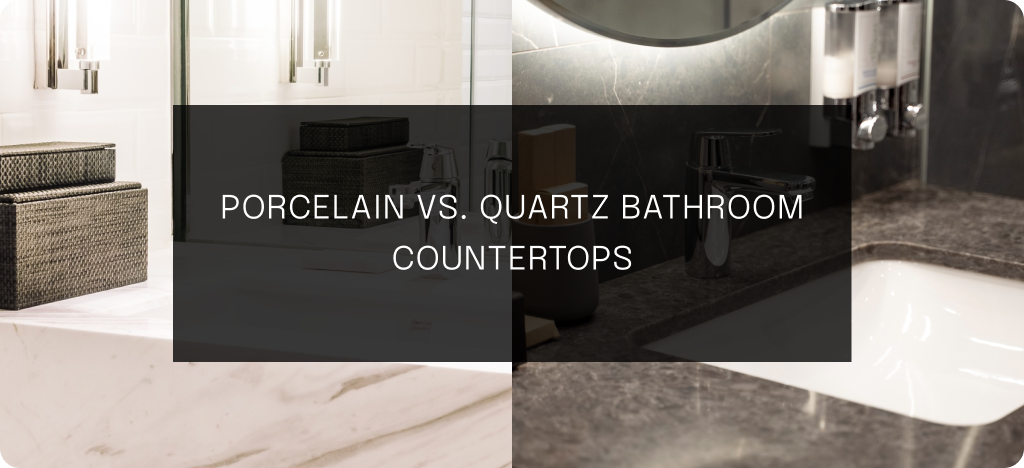Porcelain Vs Quartz Bathroom Countertops, Which one is good for your home
Picking the perfect countertops for your bathroom is a decision that reflects your personal taste and lifestyle. Your countertops will be a key part of your bathroom design, where you start and end your day and do your daily routines.
A well-decorated bathroom can help relieve stress, maximize your space, and improve functionality. It also shows off your style and fits your home’s overall look. Plus, a nice bathroom can boost your home’s value and make it easier to keep clean and organized.
Two of the most popular options for bathroom countertops are quartz and porcelain. These materials are great choices for both homes and commercial spaces. When deciding between quartz and porcelain, consider your budget, how you plan to use the space, and what looks best to you. This guide will help you understand the pros and cons of each material so you can make the best choice for your bathroom.
Porcelain Bathroom Countertop
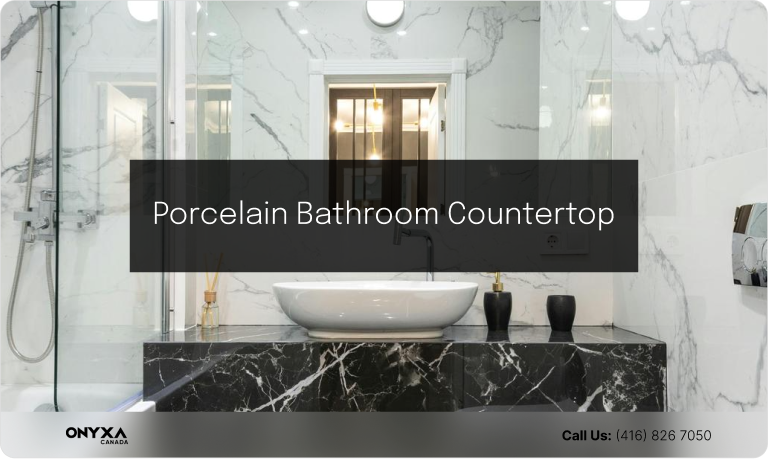
What is Porcelain Bathroom Countertops?
Porcelain bathroom countertops are made from fine clay fired at high temperatures, creating a strong, dense, and non-porous material perfect for bathrooms. They resist scratches, chips, and cracks, making them great for busy areas. Their non-porous surface means they don’t absorb liquids, so they’re easy to clean and resist stains. They can handle high heat, so you can place hot styling tools on them without worry.
Porcelain comes in many colors, patterns, and finishes and can look like marble, granite, wood, or concrete, offering many design options. Though it’s heavy and needs professional installation, porcelain is low-maintenance, needing just mild soap and water for cleaning. It is eco-friendly, too, often using recycled materials. Its durability makes it a smart investment, combining beauty and practicality to enhance any bathroom.
Pros and Cons of Porcelain Countertops
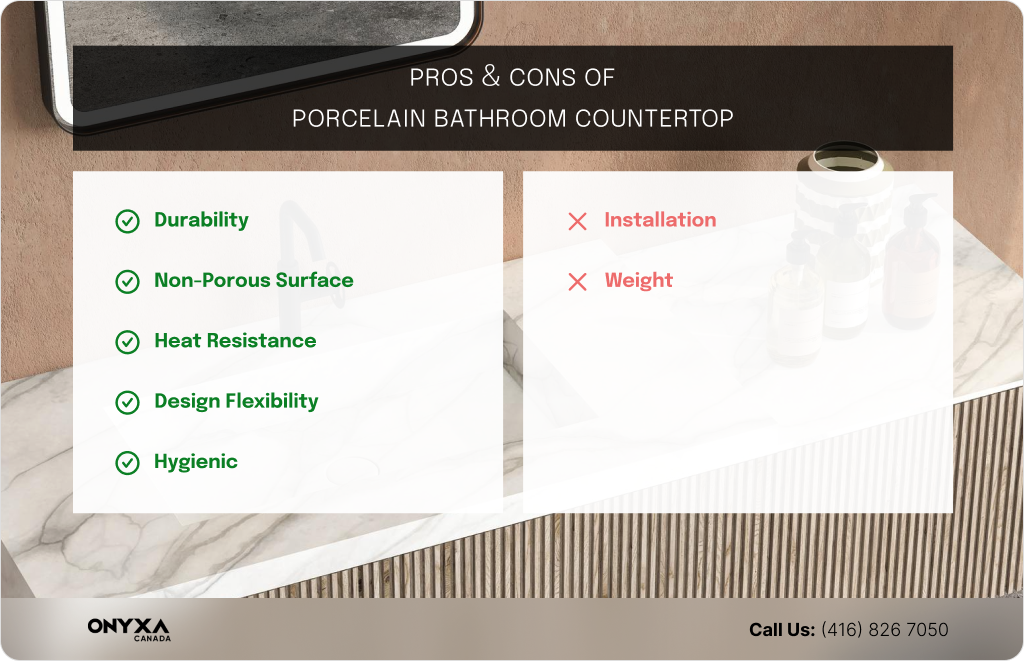
Pros:
Durability: Porcelain is highly durable and resistant to scratches, chips, and cracks, making it ideal for high-traffic areas.
Non-Porous Surface: Its non-porous nature means it doesn’t absorb liquids, reducing the risk of stains and making it easy to clean.
Heat Resistance: Porcelain can withstand high temperatures, so placing hot styling tools on its surface will not damage it.
Design Flexibility: Porcelain countertops come in various colors and patterns, including designs that mimic natural stone, wood, and concrete.
Hygienic: The non-porous surface is resistant to bacteria and mold, making it a hygienic choice for bathrooms.
Cons:
Installation: The installation process can be complex and may require professional expertise, adding to the overall cost.
Weight: Porcelain is heavy, necessitating strong support and potentially more complex installation requirements.
Quartz Bathroom Countertops
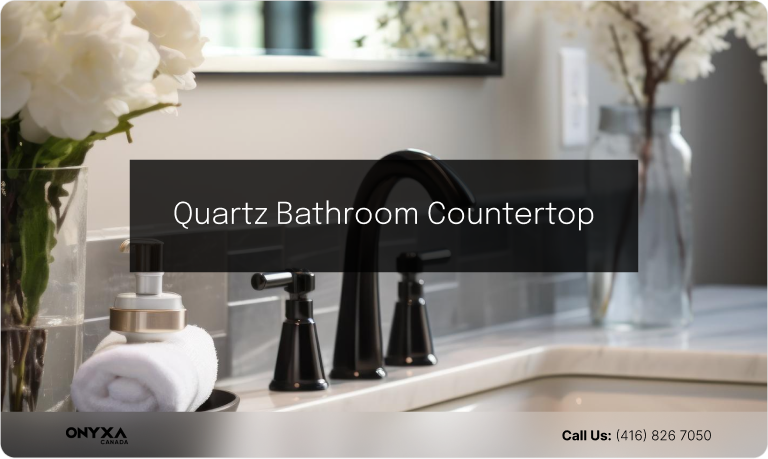
Everything about Quartz Countertops
Quartz countertops are a popular choice for bathrooms, made from a mix of natural quartz and resin. These countertops are known for their durability, resisting scratches and chips, which makes them suitable for daily use.
The manufacturing process results in a consistent appearance, and quartz is available in many colors and patterns to fit various bathroom styles.
Quartz is non-porous, so it doesn’t stain easily and helps keep bacteria and mold away, making it a hygienic option. While it can handle some heat, it is recommended to use trivets or hot pads for very hot items.
Cleaning quartz is simple with mild soap and water and doesn’t require sealing. Due to its weight and need for precise fitting, professional installation is usually necessary.
Many manufacturers use eco-friendly practices in making quartz countertops. While generally more affordable than luxury stones like marble, quartz can be more expensive than some other materials. Overall, quartz countertops offer a good mix of durability, ease of maintenance, and design versatility for bathroom use.
Pros and Cons of Quartz Countertops
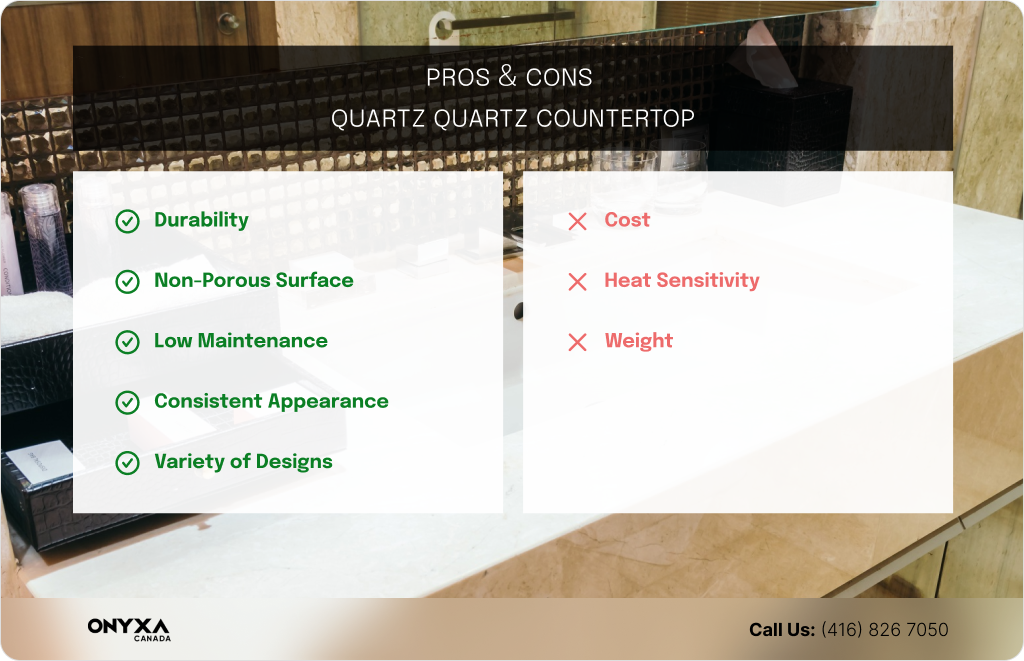
Pros:
Durability: Quartz is one of the hardest minerals, making quartz countertops highly resistant to scratches, chips, and stains.
Non-Porous Surface: Like porcelain, quartz is non-porous, preventing liquid absorption and reducing the risk of stains and bacterial growth.
Low Maintenance: Quartz countertops are easy to clean and maintain, requiring only regular wiping with mild soap and water.
Consistent Appearance: Quartz’s engineered nature ensures a uniform look, with no variations in pattern or color.
Variety of Designs: Quartz countertops are available in various colors and patterns, allowing for versatile design options.
Cons:
Cost: Quartz countertops, especially high-end options with custom designs and finishes, can be expensive.
Heat Sensitivity: Quartz can be damaged by extreme heat, so it’s essential to use trivets or hot pads for hot styling tools or appliances.
Weight: Like porcelain, quartz is heavy and requires proper support and professional installation.
Porcelain Vs. Quartz Countertops: Which is Best for You?
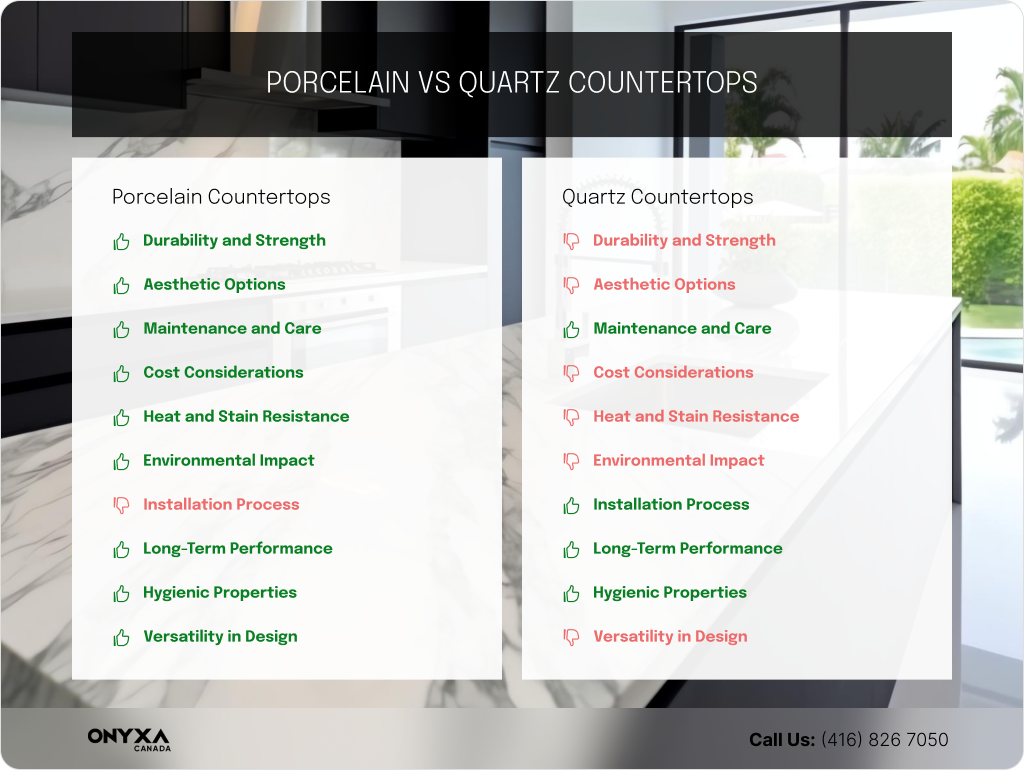
Choosing between porcelain and quartz countertops for your bathroom depends on several factors, including durability, aesthetics, maintenance, cost, and specific needs. Let’s compare these two popular options to help you decide which is best for you.
Durability and Strength
Both porcelain and quartz are very durable. Porcelain is tough and resists scratches, chips, and cracks, making it great for busy areas. Quartz is also very hard and stands up well to scratches and chips. While both materials can handle daily use, porcelain’s resistance to damage makes it an excellent choice for high-traffic areas.
Aesthetic Options
Both materials offer many design options. Porcelain can imitate natural stone, wood, and concrete, giving you many styles and patterns. Quartz, being man-made, provides consistent colors and patterns, with plenty of choices to match your taste. The best choice depends on what you personally prefer.
Maintenance and Care
Both porcelain and quartz are easy to maintain. Porcelain’s non-porous surface resists stains and cleans up easily with mild soap and water. Quartz is similarly low-maintenance, with a non-porous, stain-resistant surface that needs the same simple cleaning. Neither material requires sealing, making them perfect for busy homeowners who want a hassle-free countertop.
Cost Considerations
Cost is an important factor for many homeowners. Both porcelain and quartz countertops are premium options, and their prices reflect their quality. Porcelain countertops can range widely in cost, with some options being quite affordable and others, especially custom designs, being more expensive. Quartz tends to be consistently expensive, particularly for high-end options. When choosing, consider both the initial cost and the long-term value.
Heat and Stain Resistance
Porcelain countertops excel in heat resistance, withstanding high temperatures without damage, making them ideal for areas where hot styling tools are frequently used. Quartz, while somewhat heat-resistant, can be damaged by extreme heat, so using trivets or hot pads is recommended. Both materials offer excellent stain resistance due to their non-porous surfaces, ensuring easy cleanup and durability. Given these factors, porcelain is the better choice for areas where heat resistance is a priority.
Environmental Impact
When comparing the environmental impact of porcelain and quartz countertops, both materials have their advantages and drawbacks, but porcelain generally has a slight edge in eco-friendliness. Porcelain is made from natural clay and other raw materials, and although its production involves high temperatures and significant energy use, its long lifespan and recyclability mitigate this.
Some manufacturers even use recycled materials to reduce the environmental footprint of porcelain further. On the other hand, quartz countertops are engineered from natural quartz crystals combined with resins and pigments. The manufacturing process of quartz is energy-intensive and can produce silica dust, posing health risks if not managed properly.
However, many quartz manufacturers are adopting sustainable practices, including using recycled content. While quartz has a higher environmental impact due to synthetic additives, choosing brands that prioritize eco-friendly methods can make it a viable option. Overall, porcelain’s natural composition and recyclability make it a slightly greener choice based on Rate It Green researchs.
Installation Process
The installation process for both porcelain and quartz countertops requires professional expertise due to their weight and the need for precise fitting. Porcelain can be challenging to cut and install, requiring specialized tools and skills. Quartz, while also heavy, is easier to work with due to its engineered nature. Professional installation ensures the countertops are properly supported and securely installed.
Long-Term Performance
Both materials offer excellent long-term performance. Porcelain’s durability and resistance to damage ensure it remains in good condition for many years. Quartz’s strength and low maintenance also contribute to its long-lasting appeal. Both materials are a good investment for homeowners looking for countertops that will stand the test of time.
Hygienic Properties
Hygiene is a crucial factor for bathroom countertops. Porcelain’s non-porous surface prevents the growth of bacteria and mold, making it a hygienic choice. Quartz also offers similar benefits with its non-porous nature, providing a clean and safe surface for bathroom use. Both materials are easy to clean and maintain, promoting a healthy bathroom environment.
Versatility in Design
Design versatility is important for creating a cohesive bathroom look. Porcelain’s ability to mimic various materials allows for a wide range of design options, from natural stone to modern concrete. Quartz’s consistent appearance and variety of colors make it easy to find a design that matches your bathroom décor. Both materials offer flexibility in achieving the desired aesthetic.
Conclusion
Choosing the right bathroom countertop between porcelain and quartz comes down to your personal taste, lifestyle, and specific needs. Both materials are highly durable and offer a range of design options, making them excellent choices for any bathroom.
Porcelain is incredibly tough, resists scratches, chips, and cracks, and handles high heat well, making it ideal for busy areas and heat-prone environments. Its non-porous nature makes it easy to clean and resistant to stains and bacteria. Additionally, porcelain is often more eco-friendly, especially when made with recycled materials. However, it can be heavy and requires professional installation.
Quartz, on the other hand, offers a consistent appearance with several colors and patterns. It’s durable, non-porous, and low-maintenance, making it a hygienic and convenient choice. While it is generally more expensive and can be sensitive to extreme heat, many manufacturers are adopting sustainable practices, which helps mitigate its environmental impact.
When deciding between porcelain and quartz, consider factors like heat resistance, ease of maintenance, cost, and environmental impact. Porcelain might be better if you need a surface that handles high temperatures and offers many design possibilities. Quartz is a great choice for those who prefer a consistent look and low maintenance.
Ultimately, both materials provide excellent long-term performance and hygienic properties, ensuring your bathroom remains functional, beautiful, and easy to care for. Your choice should align with your personal preferences and how you use your bathroom space.
FAQs
How does the cost of porcelain compare to quartz countertops?
Porcelain countertops can vary widely in cost, with some affordable options and others, especially custom designs, being more expensive. Quartz countertops tend to be consistently expensive, particularly for high-end options. When choosing, consider both the initial cost and long-term value.
What are the main differences between porcelain and quartz countertops?
Porcelain is made from natural clay and other materials, fired at high temperatures, making it durable and heat-resistant. Quartz, on the other hand, is an engineered stone made from crushed quartz mixed with resin, offering a consistent look and a wide range of colors. Porcelain is better for heat resistance, while quartz is known for its durability and consistent appearance.
Are porcelain countertops more environmentally friendly than quartz?
Generally, yes. Porcelain is made from natural clay and can incorporate recycled materials, making it eco-friendly. The production process is energy-intensive, but its long lifespan and recyclability help offset this. Quartz is also eco-friendly when manufacturers use sustainable practices, but it involves synthetic resins, which may have a higher environmental impact.
How do porcelain and quartz compare in terms of maintenance?
Both materials are low-maintenance. Porcelain and quartz countertops are non-porous, meaning they resist stains and bacteria, making them easy to clean with mild soap and water. Neither material requires sealing, making them convenient for busy homeowners.
Which bathroom countertop material is more cost-effective: porcelain or quartz?
Porcelain countertops can range widely in cost, from affordable options to higher prices for custom designs. Quartz tends to be consistently expensive, particularly for high-end options. The best choice depends on your budget and the specific design you want.
Can I install porcelain or quartz countertops myself, or do I need professional installation?
Both materials require professional installation due to their weight and the need for precise fitting. Porcelain can be particularly challenging to cut and install, while quartz is somewhat easier to handle but still requires expert installation to ensure durability and proper support.
